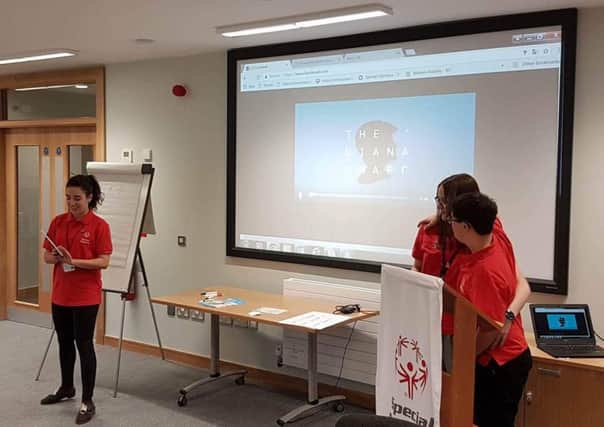Jemima Browning of Olympics Europe Eurasia: Take time to understand


How about trying to say everything on your mind but something is stopping the words coming out the way you want them to?
Just think that if every time you tried to speak someone finished off what you were saying, they just assume you cannot finish it for yourself.
Advertisement
Hide AdAdvertisement
Hide AdImagine not being able to understand symbols, gestures, social indications or speech at a certain pace or volume.
Think, how would you feel if every time you spoke people did not take the time to listen to what you had to say.
How would you feel if people walked away when you were trying to express your views because they thought you had nothing to say or were too impatient or too embarrassed to listen to you?
This is the brutal reality for people with intellectual disabilities. People do not take the time to converse with individuals with additional needs. They do not have the patience to wait for an answer.
Advertisement
Hide AdAdvertisement
Hide AdThis is wrong and a huge problem in so many regions in so many countries across the world. The reality is it is not hard to have a conversation with someone with an intellectual disability.
It is not something to be embarrassed by or afraid of. It is not a burden or a task and it is not something to be avoided.
People with disabilities are people first and foremost. Yes, they may need some extra time, patience and the occasional helping hand.
Nevertheless, they are individuals with drive, ambition, opinions, passion, incredible personalities and they deserved to be listened to and spoken to just like anyone else. It is a little nerve-wracking, like any new experience, when first having a conversation.
Advertisement
Hide AdAdvertisement
Hide AdThere are many questions that may go through your head. So hopefully this will answer some of your queries.
First and foremost, there is no fixed rule or specific way to speak to someone with a disability. just like there is no fixed rule of specific way to speak to anyone you come across. There are, however, a few things to bear in mind that will make the experience for everyone involved.
Ensure you address the individual. There is nothing worse than being in a room where everyone is talking about you like you weren’t there.
Do not ask questions of parents, siblings, carers or friends. Speak to the person, get to know them. This will make both of you feel more comfortable.
Advertisement
Hide AdAdvertisement
Hide AdMany people involved in the Special Olympics movement when asked what would you like to happen when people have a conversation with you said, “speak to me” “I can answer for myself”.
Next is to remember to take your time and be patient. Speak in a clear voice and do not use jargon. I know there is nothing worse when someone is speaking so quickly to me that I can’t follow along. Then be considerate and wait for a response. Do not finish anyone’s sentences and do not cut anyone short. But also, be mindful of how you say things, the tone of your voice. Do not patronise, that is one of the most important things.
The final thing is to ask questions. Never be afraid to ask! Ask in a kind and considerate way and you will get an answer. Do not assume what others can or cannot do or understand. If in doubt just put forward a question and learn from the answer.
People with disabilities have so much to offer and so much they want to say. Please do take the time to be accepting and show others the respect you would wish for.